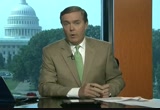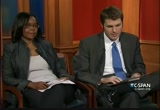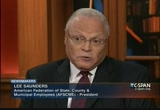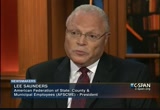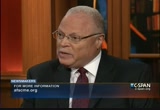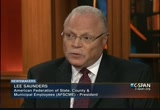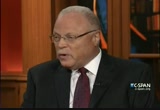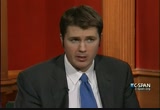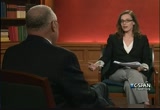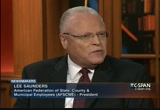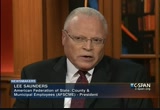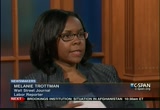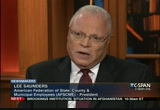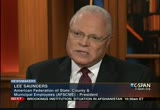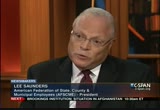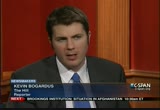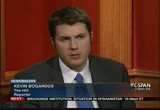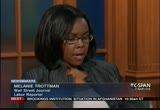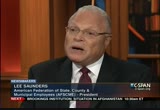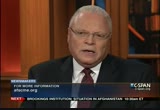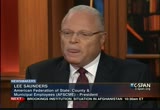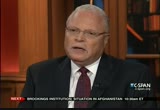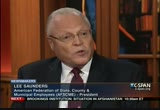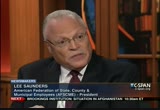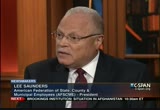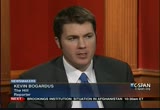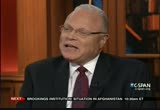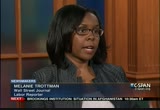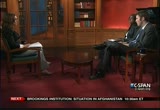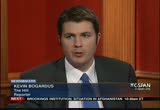tv Newsmakers CSPAN July 8, 2012 10:00am-10:30am EDT
10:00 am
morning. "washington journal" at 7:00 a.m. eastern time. thank you for joining us. i hope you enjoy the rest of your weekend. have a great week ahead. [captioning performed by national captioning institute] [captions copyright national cable satellite corp. 2012] next "newsmakers" with lee saunders. then, we discussed the situation in afghanistan. then, bob dima and testifies before a british house of commons committee. >> our guest on "newsmakers" is lee saunders, resident of the american federation of state, county, and municipal employees. thank you for being here.
10:01 am
to ask him questions, we have a labor reporter for "the wall street journal" and a reporter for "the hill." >> i would like to know what enthusiasm is like for president obama's reelection. you have backed him. i know you are putting a lot of resources behind him being reelected. what are your battlegrounds states this year? >> or people are very excited. we came off of our convention where we had 3600 delegates. we had about 5000 people in attendance. they are ready to work. they are ready to work hard for the president. they understand the importance of this election and the differences that exist between president obama and mitt romney. where president obama stands with rebuilding the middle class in supporting working families and not supporting the 1% as romney does. we are ready. we are engaged in the battle.
10:02 am
we will be an every battleground state. we will be knocking on doors and making phone calls. our people will be engaged. >> what are a few examples of the key states you are targeting? >> we are looking at ohio. i am about that. i will spend a lot of time there . we are looking at florida. michigan. you will go into north carolina. all of the battleground states. we will be playing very heavily because this election is so important. >> are you concerned that mitt romney's campaign is spending time in reliably democratic, such as michigan, pennsylvania, minnesota? >> they will go into those states thinking they might have an opportunity. one thing that we have that they do not have is a strong grass- roots effort. we will have our members out there working. every single day. we will be working with our coalition partners and our
10:03 am
partners in the communities across the country. we will be educating and mobilizing our days all over the states in the battleground states. we might not be able to compete with the money, but we will be able to compete because we a people power. that is what we will use. >> melanie mentioned wisconsin. after the wisconsin recall some leaders were frustrated with a lack of support from national democrats that challenge scott walker. is that all forgiven? >> i was in wisconsin for election night. i had not been there for awhile -- i had been there for a while working with coalition partners. we do not the wisconsin has a loss. it was a disappointment. it was a setback. i got an e-mail from our members from wisconsin the night of the election. the e-mail said -- i feel like i
10:04 am
have been hit in my gut. mighty careless. my mouth is bleeding. i'm going to go back to bed tonight and i'm going to wake up and i will be fired up and i am going to be working very, very hard to support the work of the middle class. that is how our members feel. they will continue to be engaged. we were born in wisconsin, our union. we were there yesterday. we're there today. we will be there tomorrow fighting the good fight. i am optimistic we will win in the end. our partners have made a strong statement. we were able to we take -- senate.the we will continue to treat that as a priority state. the democratic party was there.
10:05 am
they supported our efforts. it was grass-roots base to fund community. based upon the labor unions, public and private. that coalition is sticking together. >> to follow up, are things better than they were a couple of weeks before? there was grumbling from some in labor that national democrats were not read the response and we call election -- >> is a non-issue. the election is over. our coalition is intact. we are mobilizing education and organizing our members. we are organizing those communities. we're going to win in the end in wisconsin. >> you mentioned the money on the other side coming from business and supporting republicans and things like that. some other unions have created day superpac. are you going to do that?
10:06 am
is that under discussion? >> we use voluntary dollars that are raised by members. independent expenditure programs. we want to be able to talk with our members and we do that every single day. we will do it to communicate and educate them on the importance of this election and the differences that exist between both candidates. we will be playing at the state level, also. legislative elections are born to our people. gubernatorial elections are important. we want to have the ability to knock on non-members doors. >> one of the main criticisms by your opponent in your union election was -- he says your political spending focused on federal races rather
10:07 am
than state and local. what do you think of that? are you going to spend more on state and local races? >> we have to look at the facts. 65% of our budget is spent on local sites and states' rights. that is a fact. our budget shows that. we believe we have to play in all arenas. we have to play in d.c. and also in our own neighborhoods. we have to make sure that we are getting tools and resources necessary to let working families, to fight back against the attempts to steal voices away from us. we have to be engaged and involved in all of those sites. that is where the 65% is being spent on. >> you were just elected president last month of afscme. the first african-american to serve in that role. talk to us about reaching out across various communities in the country. how are you going to lead an
10:08 am
effort to reach out to more household and get them invested in what the unions are doing and motivated to participate politically? >> i will get a plug to my book. "the main street moment." we talk about the need to develop coalitions all over this country. we talk about the need to mobilize our members all over this country. we need to work with our communities because our members are part of the community. we have to do that. we have to educate people about the value and the importance of unions in this country. if it was tough for unions, we would not have a strong middle class. there is a direct correlation between the decline of the middle class and the declining in the membership today. in the private sector, membership 7%. in the public sector, 35%. we have to have a truck -- strong private-sector trade union to be successful. we have to communicate and to keep folks about what union stand for and what we have been able to do. how we have been able to lift
10:09 am
that it increase wages. they should not be rushed to the bottom in this country. we are better than that. this is the richest country in the face of europe. instead of rushing to the bottom, we have to figure out ways to raise the boat for everyone. >> you grew up in a union household. your father was a bus driver and her mother a community organizer and a community college professor. do you think unions are necessary for the same reasons now as they were then? >> no question. i grew up in a union household. we would talk about the importance of solidarity and working families standing together in solidarity to move to support increasing wages and benefits. we are still faced with those troubles today. you have governors in this country, the ultraconservatives who are trying to hurt us. they're trying to take control of the ball game. it went to silence our forces by
10:10 am
stealing collective bargaining. we have had that for so many years. they are trying to limit the ability of unions to represent workers. why are we doing that? they are doing that because they represent -- we represent a force to be reckoned with. we have to continue to develop ways to grow our membership. afscme is doing just that. over the past two years, we have added 50,000 members. we have to keep to grow. other unions must do the same. we represent a force in this country and they do not want to see it. they do now to see working families have a fair shake. they do not want to see the middle class be able to pay for their education for their kids or put food on the table. it is a sick society when we have the top 1% of the country wedding more and more power and more and more wealth at the expense. >> you called it aand
10:11 am
assault on unions. where will the battle go next? what lawmakers are you keeping an eye on? what initiatives are you concerned with? >> we are looking at lawmakers. we have to be more active in electing to local posts. we have a recruiting program or we are urging members to run for elected offices, the most basic kinds. we are urging folks to do that. we are educating them. we are also having to reevaluate our relationships with our allies. we have to pay more attention to community building, a coalition building across the country. working with civil-rights organizations, working with women's organizations, seniors. working with students. we have to bring the coalition together because what we stand
10:12 am
for is very similar. we have to make every effort. it is hard work. we have to make every effort to bring these organizations together. >> you started as a labor economist at afscme. business groups say that actually union priorities hurts the economy. i am assuming you disagree. can you tell us why? >> because we believe that we build upon the economy. when you have a strong foundation within the private sector and public sector, when you have jobs and the growth of wages and benefits, that helps the economy. not only at state and local governments, but across the country. we have those who believe tax breaks and giving more taxpayers to the richest 1% of the society is the way to solve the economic problems in this country. that is not solving a problem. that trickle-down approach has never worked. it will not work in the future. the way to solve problems is to lift the boat.
10:13 am
rebuild and middle class. the poor working families. >> one thing i would like to follow up on is talking about the economy. palm we did some unions have made concessions lately -- some unions had made concessions lately and they just came up with a new deal with the new york governor, andrew cuomo, where they reduced or froze their wages. is that a way public-sector unions are going to go? or is that the wrong approach? how do you feel? >> the one thing we cannot let happen is for politicians, and scott walker tried to do, tear apart the fabric of what we are about. that is collective bargaining.
10:14 am
when you sit at the table and negotiate with the employer, you are talking about issues, problems. you had these governors who tried to steal our voices where we do not have that opportunity. we are treated as equals. we cannot sit at the table and talk about those issues. if they see the community is suffering and the local and state government is suffering, they will not talk about changes. they're not gone to talk about changing benefits and wage levels. you do that through the process of collective bargaining. we refuse to sit silently by while these governors tried to take collective bargaining away from us. >> you mentioned the governor of ohio.
10:15 am
compare what happened there to wisconsin. >> wisconsin was a recall. recalls are hard to do. as a matter of fact, there have been people saying they believe that once a politician is elected, unless they're doing something bad, they should stay in office. the way to get them out of office is to put them out of office. the process in ohio was different. it was a referendum. there was a referendum on a specific subject. do public service workers have the right to collective bargaining? that was won by two to 1. we won that because we knocked on doors. we indicated our communities. we make phone calls. people knew that that was unfair what casey was trying to do. they voted in support of collective bargaining in that state. >> do you feel labor has support on the issues from candidates?
10:16 am
tom barrett was not as popular in wisconsin -- >> i think you have to look at a variety of factors in wisconsin. the fact that it was a recall. the second is you look at all the money that was poured in wisconsin from the outside. $60 million. $60 million for a governor's race to keep a governor in office. our effort was grassroots. our effort was knocking on doors and making those phone calls and educating wisconsin. they had that kind of money. they were able to advertise a and put it out -- and put it out on the airwaves. >> in san jose, registered democrats outnumber republicans and they forced union workers to pay more for pensions or
10:17 am
express or modest benefits. chuck reed said liberals and conservatives understand the same thing. we have to cut services to pay for pensions. are you concerned that the public voting record on some recent labor backed initiatives means that the public is growing was sympathetic to union priorities? >> it depends upon the issue and how we educate folks in all i . we were able to win. we keep collective bargaining. in florida, we stopped the privatization of state services. we did that with the help of moderate republicans. we have to set the facts straight. the average pensions that a retiree receives is 18 dozen dollars per year. some folks say that is a huge amount. but they are ripping off the system. $18,000 is not a huge amount.
10:18 am
that represents money that the pensioner put into the system. this is not coming from the state. it is money the employee has put into the system because they have expected a retirement at the end of the year. at the end of their years. we have to get those facts out. i would like to bring to get are not only folks that labor unions but academics and sit down and talk about the issue of pensions. i propose to do that. i said that was going to be a priority for my administration and we would be looking at the pension issue. maybe thinking outside the box and seeking advice, recommendations. have the communications with people outside of labor. that is where we should go with this. it is a tough issue. we have to do with it. i said this earlier, we're the richest country on the face of the earth. we should not be talking about
10:19 am
rushing to the bottom were people are getting substandard wages an. we have to consider ways in which we raise the boat. >> we have about seven minutes left with lee saunders, the president of afscme. >> you mentioned pensions. you might want to start a national dialogue about that. what else do you plan to do differently? anything new? you are nearly the president of afscme. >> we will continue to organize new members. that will be the number-one priority for us. i think that we have to always look at change and not be afraid of it. this is a changing environment that we live in here we have to consider ways in which we can educate and mobilize our members and have them more activated in
10:20 am
the practices and policies of the union. we are establishing chapters over the country. we want to activate those inside of our unions. we want to think of ways in which we can dialogue can be more open and transparent. our members feel a real part and feel engaged in the activities of the union. that is what we are doing in wisconsin. we will -- we were able to do that in ohio. we have to do that over the country. it is becoming more engaged and thinking outside the box, whether it is on pension issues or other kinds of issues. we are exploring every kind of avenue to benefit working families and strengthen the middle-class. >> you are looking to different groups of workers. are there other groups you plan to organize? >> we are a public service
10:21 am
union. that means we represent state, local government. we have paid attention to khalkha workers. we are going to be to need to organize those workers. we have a new home care worker out of california who will be my partner in moving forward. >> the supreme court recently had a ruling dealing with fees paid by non-union members that can be used for political members without their consent. >> let us be clear about what the decision did. it was based upon a special assessment that one of the union's levied against its members. a special assessment. what you had was justice scalia decided to take it upon himself to challenge the whole notion of
10:22 am
charging nonmembers a fee for the work that we do within that unit. he decided that maybe we should look at the whole notion of agency fees or the nonmembers pay a certain feet into the union. he took it out of bounds. that just shows you where their heads are. they wanted challenges every step of the way. they want to have fees associated with representing nonmembers, which we are obligated to do in the public sector. they want to take us out of the ball game. we are not going to stand for it. >> what will that mean for your activities and for your bottom line? >> what they ruled so far will not affect us at all because we have not had special assessments. what justice scalia suggested will have an impact on us.
10:23 am
it had nothing to do with that case in front of them. that just shows you -- >> we have three minutes left. >> what is your reaction to the health care law and the fact republicans are saying that maybe they will implement provisions throughout the s?ate' >> we supported health care reform and obamacare. we believe that the argument should be over. it was passed by congress. signed by the president. it was validated by the supreme court. we believe we have to get on with talking about creating jobs in this country and rebuilding our economy. some states with republican governors say that they will not accept the medicaid dollars that the federal government will move to those states to increase or decrease the number of all uninsured in those states.
10:24 am
we think that is crazy. the federal government will be giving 100 percent and back to those states for two years -- 100 percent and back to the states for two years. in states like florida, louisiana were you have governors talking about not accepting the money, they have the highest uninsured rate in this country. they are also playing politics. they're playing politics. it seems to me that some of those governors are interested in becoming the running mates of mitt romney. that is that business to play politics with people's lives. the purpose of health care reform was to provide health care for all. if they do that except those medicaid dollars, they are not providing health care for all within their own constituency with in those states. we will highlight that. >> one more question. >> we mentioned mitt romney.
10:25 am
afscme is typically one of the biggest political spenders in the labor movement. do you plan to keep that reputation? to you plan to -- you said "we are the big dog." [laughter] do you plan to continue to be the big dog in the labor movement when it comes to spending? >> we will play heavily at the national level and the state and local government level. that is where we can effect change. by electing pro workers -- pro- worker majorities and governors who think like us to support working families and want to rebuild the middle class. we will continue to do that every single day. >> how much do you plan to spend? i have seen $100 million. >> i have no idea. >> no idea? [laughter] >> no idea.
10:26 am
we are going to be effective in utilizing -- our resources to let wopro-working family candidates. >> we have time for lee saunders -- thank you for being with us this week. stay with us to reflect our our reporters. melanie, what did you hear that stood out? >> is stood out that he wants to start a dialogue about pensions. he was not specific about what that would look like. there are obviously state lawmakers, republican governors who want to cut pensions and have already moved in that direction. that will be a big battle that this union will face in the coming years. it is possible that dialogue can result in a national dialogue similar to the one we have had
10:27 am
about collective bargaining. that would be a big development. >> we talked politics. u.s. questions. we did not give specifics about politicians that are targeting battleground states. >> that was definitely one nation. afscme one of the biggest political spenders. i think he showed that afscme has moved on be on the recall election in wisconsin. i think his word was that each is xe issue. we are still moving on. we will still fight in wisconsin. this union is incredibly important to politics. the have a lot to do at the state and local level. the fact that they plan to be as active as they have been is interesting. >> could this election year be
10:28 am
indecisive for the unions? >> he said that mitt romney in the white house would mean harm to the middle class and the end of collective bargaining rights. for unions, yes, they have drawn a line in the sand. they will try to make a clear distinction between mitt romney as president and president obama as president. and what that would mean for unions and they have changed their messaging to say that what it will mean is a serious thing for 99% of working people in this country. >> lee saunders was just elected as the head of afscme. do you have a better sense of how he will lead? >> we are still figuring that out. he has been involved with afscme for several years, and was close to his predecessor. time will tell. we will still see a politically
10:29 am
active afscme and one that is greatly concerned about what is going on outside of washington. >> one thing he said that struck me was that organizing is their number-one priority. we all know that union membership has been declining. particularly in the private sector and more recently in the public sector. unions have been criticized by some for not organizing enough. some who support union organizing. they're people who say they have been focusing more on politics and they should get back to organizing more. it will be interesting to see how much of the priority placed out over the next year. he mentioned child care workers. whether or not they will be successful at boosting those numbers. >> what are states you will be watching for union power? >> the midwest. you have to keep an eye and wisconsin. ohio. labor had a huge success in pushing back on collective pushing back on collective bargaining
119 Views
IN COLLECTIONS
CSPAN Television Archive
Television Archive  Television Archive News Search Service
Television Archive News Search Service 
Uploaded by TV Archive on

 Live Music Archive
Live Music Archive Librivox Free Audio
Librivox Free Audio Metropolitan Museum
Metropolitan Museum Cleveland Museum of Art
Cleveland Museum of Art Internet Arcade
Internet Arcade Console Living Room
Console Living Room Books to Borrow
Books to Borrow Open Library
Open Library TV News
TV News Understanding 9/11
Understanding 9/11